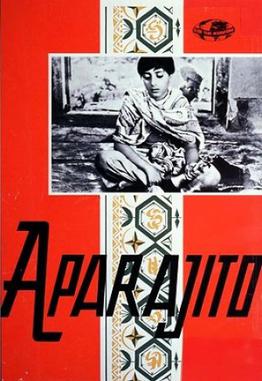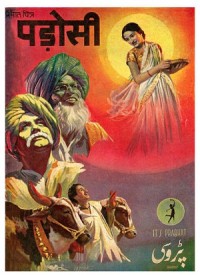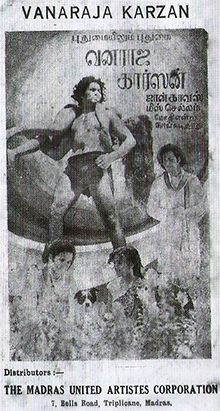Related Research Articles

Aparajito is a 1956 Indian Bengali-language drama film written and directed by Satyajit Ray, and is the second part of The Apu Trilogy. It is adapted from the first half of Bibhutibhushan Bannerjee's novel Aparajito. It starts off where the previous film Pather Panchali (1955) ended, with Apu's family moving to Varanasi, and chronicles Apu's life from childhood to adolescence in college.
Ganga Maiyya Tohe Piyari Chadhaibo is a Bhojpuri film released in 1963 directed by Kundan Kumar. It was the first-ever Bhojpuri film, and starred Kumkum, Ashim Kumar and Nazir Hussain. It had music by Chitragupta, lyrics by Shailendra and songs sung by Lata Mangeshkar and Mohammad Rafi.

Bhojpuri cinema, is the segment of Indian cinema dedicated to the production of motion pictures in the Bhojpuri language widely spoken in the state of Eastern Uttar Pradesh and Bihar with major production centres in Lucknow and Patna. The first Bhojpuri talkie film, Ganga Maiyya Tohe Piyari Chadhaibo, was released in 1963 by Vishwanath Shahabadi. The 1980s saw the release of many notable as well as run-of-the-mill Bhojpuri films like Bitia Bhail Sayan, Chandwa ke take Chakor, Hamar Bhauji, Ganga Kinare Mora Gaon and Sampoorna Tirth Yatra.

Appu Chesi Pappu Koodu is a 1959 Indian Telugu-language comedy drama film directed by L. V. Prasad. The film was produced by Nagi Reddi and Chakrapani of Vijaya Productions; the latter co-wrote its script with Prasad and Vempati Sadasivabrahmam. It is the Telugu version of Prasad's Tamil film Kadan Vaangi Kalyaanam (1958). Starring N. T. Rama Rao, Relangi and Savitri, Appu Chesi Pappu Koodu features Jaggayya, C. S. R. Anjaneyulu, S. V. Ranga Rao, and Jamuna in supporting roles. The conflict between two older men with different mindsets—Ramadasu and Mukundarao —is the film's centrepiece.

Homi Wadia was an Indian film director and producer in Bollywood. He was the co-founder of Wadia Movietone productions, established in 1933 and later after the closure of Wadiatone, he founded Basant Pictures in 1942. In a career spanning five decades, he directed over 40 films, including Hunterwali (1935), Miss Frontier Mail (1936), Diamond Queen (1940), Shri Ram Bhakta Hanuman (1948) and fantasy film Hatim Tai (1956). He was also a founding member of the Film & Television Producers Guild of India, established in 1954. Homi Wadia was married to actress and stunt woman Fearless Nadia. Homi was the younger brother of JBH Wadia, who was himself a movie director.
Jamshed Boman Homi Wadia, commonly referred to as J. B. H. Wadia, was a prominent Bollywood movie director, screenwriter, producer and founder of Wadia Movietone Studio. He was born in prominent Parsi family which hailed from Surat, Gujarat whose ancestral business was ship building. Their family name of Wadia stands for master shipbuilders. In a family of entrepreneurs Wadia is credited with creation of movies involving populist stunt roles including those by Fearless Nadia and bringing concept of stunt actresses in Indian cinema.

Lutaru Lalna is a 1938 Indian Hindi-language action adventure film directed by Homi Wadia and produced by Wadia Movietone. The music was composed by Master Mohammed and Baldev Naik. The film starred Fearless Nadia, Boman Shroff, Sardar Mansoor, Sayani Atish and Sarita Devi.

Punjab Mail is 1939 action adventure Hindi film directed by Homi Wadia for Wadia Movietone. The score was provided by Madhavlal Damodar Master, and stars Fearless Nadia, John Cawas, Sayani Atish, Sardar Mansoor, Boman Shroff and Sarita Devi. The film once again had Nadia playing the avenging female with mask and whip astride a horse dispensing justice and beating up the villains.

Zimbo is a 1958 Hindi action adventure film directed by Homi Wadia and produced by Basant Pictures. John Cawas, the earlier hero of most Wadia Movietone adventure films is credited in the title role of the film as associate director, with special effects by Babubhai Mistry. The screenplay was by JBH Wadia with dialogues by Chand Pandit. The music was composed by Chitragupta, with lyrics by Majrooh Sultanpuri. The film starred Azad, Krishna Kumari, Chitra, Achala Sachdev, Sheikh and Dalpat.

Jungle Ka Jawahar is a 1953 Hindi action adventure film directed by Homi Wadia and produced by Basant Pictures. The story was written by Boman Shroff and the special effects were by Babubhai Mistry. Having played daredevil roles starting in the 1930s, Fearless Nadia was still playing lead action roles in the 1950s and continued to act till 1968. The film starred Fearless Nadia, John Cawas, Leela Kumari, Shyam Sunder and Shapoor Aga.

Alibaba And 40 Thieves is a 1954 Hindi fantasy action film directed by Homi Wadia. The film was a Basant pictures presentation under the Wadia Brothers Production banner. The story, screenplay and additional dialogue were by J. B. H. Wadia, while the dialogues were written by Chand Pandit and Tahir Lucknavi. The art direction and special effects were by Babubhai Mistry. The music was composed by Chitragupta and S. N. Tripathi. Chitragupta had worked as an assistant to S. N. Tripathi in some of the mythology and fantasy films before branching out on his own. The lyricist was Raja Mehdi Ali Khan. It stars Mahipal, Shakila in the lead roles, with S. N. Tripathi, B. M. Vyas, Sharda, Lalita Kumari and Helen.
Rajkamal Kalamandir was a noted film production company and studio in Mumbai. It was established by V. Shantaram in 1942, after he left Prabhat Films. The studio produced films both in Hindi and Marathi, and it was best known for Dr. Kotnis Ki Amar Kahani (1946), Amar Bhoopali (1951), Jhanak Jhanak Payal Baaje (1955), Do Aankhen Barah Haath (1957), Navrang (1959) and Pinjra (1972). In its heyday, Rajkamal was one of the most sophisticated studios of the country.

Wadia Movietone was a noted Indian film production company and studio based in Mumbai, established in 1933 by Wadia brothers J. B. H. Wadia and Homi Wadia. It was most known for stunt, fantasy and mythological films, including Hunterwali (1935).

Shejari is also known as Padosi in Hindi version as. Padosi is a 1941 Indian social drama film directed by V. Shantaram. It was produced by Prabhat Film Company and the bilingual film in Marathi and Hindi was the last film Shantaram made for Prabhat before venturing to form his Rajkamal Kalamandir. The film is cited as one of the three social classics Shantaram made at Prabhat. The other two were Duniya Na Mane (1937) and Aadmi (1939). The story and dialogue were by Vishram Bedekar in the Marathi version, while the dialogues in the Hindi version were by Pandit Sudarshan, who also wrote the lyrics. The music director was Master Krishnarao. The famous character artist Radhakrishan made his acting debut in the film as a villain. The film starred Mazhar Khan, Gajanan Jagirdar, Anees Khatoon, Radha Kishan, Lajwanti, Sumitra, Gopal and Balak Ram.
Shri Nath Tripathi was an Indian composer, whose active years were from the 1930s to the 1980s.
Hiten Kumar, born Hiten Mehta, is an Indian actor in Gujarati cinema.

Harji Lavji Damani, better known by his pen name Shayda was a Gujarati language poet, novelist, short-story writer and playwright from Gujarat, India. He is known as Ghazal Samrat, the king of ghazal poetry, as he established the Gujarati ghazal form in Gujarati literature.
Percy is a 1989 Indian Parsi Gujarati comedy drama film directed by Pervez Merwanji. The film is about a Parsi boy from Bombay. The film was well received and won the 1989 Best Gujarati Film Award at the National Film Awards.

Vanaraja Karzan is a 1938 Indian Tamil-language action adventure film directed by Homi Wadia and Nari Ghadiali. The film stars John Cawas and K. R. Chellam. It is the first Tamil film based on the character Tarzan, the first Tamil film to be shot in forests, as well as the first South Indian jungle-based film. Vanaraja Karzan was released on 4 June 1938, and became a commercial success, besides receiving significant attention for Chellam wearing a revealing outfit. The Hindi version, Jungle King was released the following year.
Chunilal Vardhman Shah (1887–1966) was a Gujarati novelist and journalist from Gujarat, India. He was awarded the Ranjitram Suvarna Chandrak in 1937.
References
- ↑ Annette Wannamaker; Michelle Ann Abate (2012). Global Perspectives on Tarzan: From King of the Jungle to International Icon. Routledge. pp. 122–. ISBN 978-0-415-89724-2 . Retrieved 24 September 2014.
- ↑ "Toofani Tarzan (1937)". Gomolo.com. Retrieved 24 September 2014.
- ↑ "Toofani Tarzan 1937". Latest Hindi Songs Lyrics. Retrieved 24 September 2014.
- ↑ "Toofani Tarzan (1937)". Alan Goble. Retrieved 24 September 2014.
- ↑ K. Moti Gokulsing; Adjunct Fellow East-West Center Hawaii Scholar in Residence Wimal Dissanayake; Wimal Dissanayake (17 April 2013). Routledge Handbook of Indian Cinemas. Routledge. pp. 288–. ISBN 978-1-136-77284-9 . Retrieved 24 September 2014.
- ↑ "Still Magic". Tasveer Ghar. Retrieved 24 September 2014.
- ↑ "Toofani Tarzan 1937". Muvyz, Inc. Retrieved 24 September 2014.